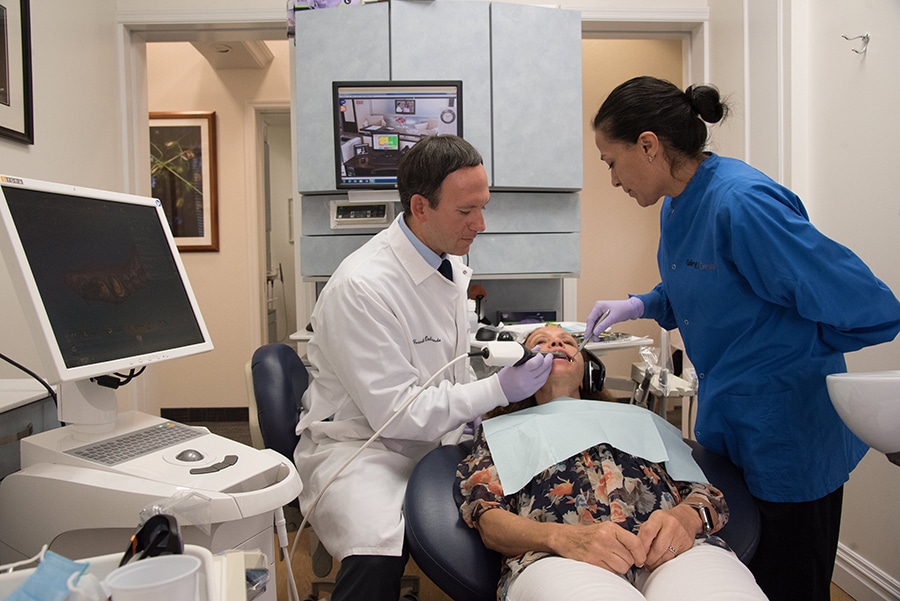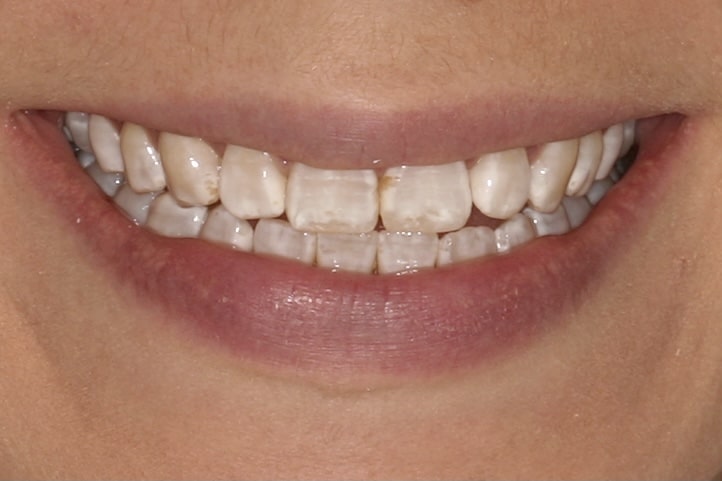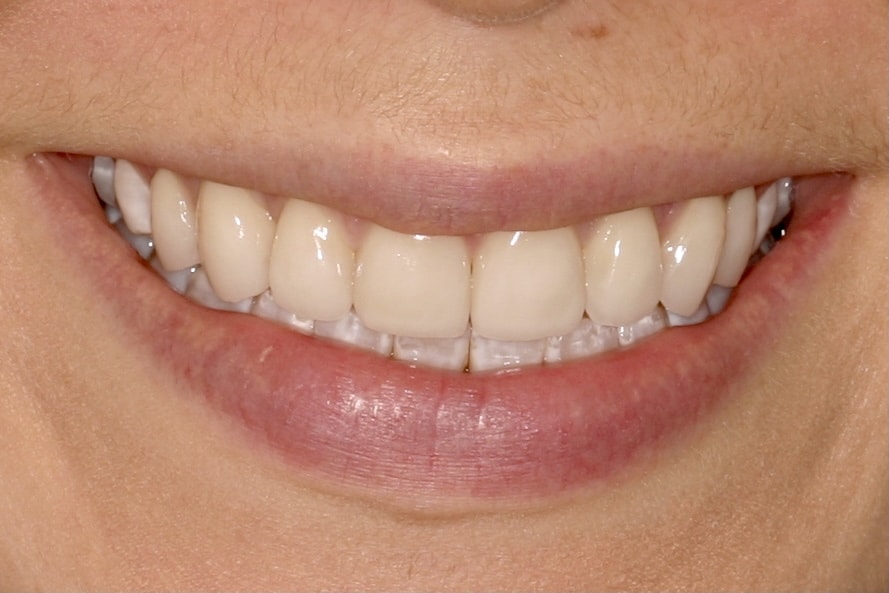
Cosmetic Dentistry Services
While your teeth may be healthy enough, you may have issues with certain aspects of their cosmetic appearance. Maybe your teeth were stained teeth from a reaction to tetracycline when you were a kid. You could have a chipped tooth. There may be a gap between teeth. Nothing seriously wrong, just aesthetic issues.
When Dr. Koenigsberg and our other Gallery 57 dentists address these types of dental problems this is cosmetic dentistry. The goal is to improve the overall beauty of your smile.
Read what our patients are saying!
What is cosmetic dentistry?
With cosmetic dentistry, our team of dentists and hygienists seeks to improve the appearance, but not necessarily the function, of a person’s teeth and overall smile. Cosmetic dentistry improves aesthetic issues such as staining, correcting misshapen teeth, alignment, reducing a gummy smile, and the like.
These are some of the common cosmetic procedures we offer:
- Veneers — Ultra-thin porcelain shells are placed over the front sides of the teeth. Veneers can change the color or shape of the teeth. They can correct unevenly spaced, crooked, chipped, oddly shaped, or badly discolored teeth.
- Gum contouring — Thanks to our diode laser, we can reduce gummy smiles and adjust the gum line, all without needing sutures and with far less bleeding and minimal discomfort afterward.
- Whitening — We offer in-office or at-home whitening that can make your teeth about eight shades whiter.
- Bonding — Tooth-colored dental resin is used to close gaps, cover badly stained teeth, or cover chips and cracks in teeth.
- Crowns — While crowns are used to anchor bridges and to return strength to a badly decayed or damaged tooth, they can also be purely cosmetic. A crown can cover a misshapen tooth completely, changing the shape and appearance for the long haul.
- Contouring and reshaping — We can subtly change the shape of a tooth or teeth by removing small amounts of the tooth enamel. This painless procedure makes minor adjustments in the appearance of a tooth.
What kinds of cosmetic problems can be corrected with cosmetic dentistry?
Short of dramatically moving teeth (which would require orthodontics), we can address most other issues. Remember, these are not issues with the health of the teeth and gums, simply with their appearance. Any problems with the health of the teeth need to be taken care of before we can begin any cosmetic dentistry work. These are typical cosmetic flaws we can fix:
- Closing gaps between teeth
- Whitening badly stained teeth
- Straightening poorly aligned teeth
- Fixing chipped teeth
- Covering badly pitted teeth
- Changing the shape of misshapen teeth
- Reducing gummy smiles
- Lengthening overly short teeth


What’s the benefit of having cosmetic dentistry work done?
What’s the benefit of loving your perfect smile? What’s the benefit of taking a smile featuring stained teeth, small gaps between teeth, maybe a chipped tooth, and the like, and changing it into a smile you can, literally, smile about?
Your smile is an important part of your self-confidence, especially when meeting with new people or in other social situations. The cosmetic improvements we make with our cosmetic dentistry treatments can make you want to smile and show off your teeth, rather than worrying about whether or not another person is noticing that gap between your front teeth or that misshapen incisor.
Who is a good candidate for cosmetic dentistry treatment?
To be a good candidate, the issues with your smile need to be cosmetic in nature. Things like decay, gum disease, and deep cracks, or overly large chips all affect the overall health of the teeth. These aren’t cosmetic problems.
But if you have cosmetic issues such as a chip here, a slight gap between teeth there. If your teeth are stained from a reaction to tetracycline given to you as a child, cosmetic dentistry is the way to correct them. If only a tooth or two is stained, we could use composite resin bonding or even maybe a single veneer. If your staining is widespread, a full set of porcelain veneers would cover it and give you a brilliant white smile.
Cosmetic dentistry can give you a perfect smile, and who wouldn’t like that?
Is cosmetic dentistry safe?

These treatments are completely safe and non-invasive. Using our diode laser for gum contouring is minimally invasive, but because the laser energy closes the incision at the same time it removes the tissue, there is virtually no risk of infection.
Is cosmetic dentistry painful?
These are not painful treatments. If we are placing a crown, we will numb the tooth prior to shaving it down to make room for the crown, but that’s about it. Otherwise, treatments like bonding, whitening, and the like are easy to take and pain-free.
How much do cosmetic dentistry procedures cost?
When our Gallery 57 Dental dentist meets with you to discuss your needs, he or she will map out a plan to give you the beautiful smile you seek. Every patient’s needs are unique, so the cosmetic plan we create is unique. While one patient needs bonding to cover a chip, another may need gum contouring to reduce a gummy smile. Once we have a good idea of what your needs are, we will give you a precise estimate of your costs.
FAQ
What Are The Benefits of Cosmetic Dentistry?
Cosmetic dentistry is a practice that enhances your smile, but there are other benefits as well. The first benefit is how cosmetic dentistry boosts self-confidence. Many people who have aesthetic dental problems have low self-esteem. Cosmetic dentistry offers various services that can help straighten and whiten your teeth. This not only makes your smile brighter but can also help restore your self-confidence.
Another benefit of cosmetic dentistry is how it can benefit your gum health. The health of your gums is just as important as your teeth. Some people are born with extra gum tissue, which can result in them having a “gummy smile.” This is why they turn to gum contouring, a cosmetic dental procedure that removes excess gum tissue and gives people a more balanced smile.
Does Cosmetic Dentistry Affect My Oral Health?
Before a cosmetic procedure can take place, your oral health is considered. The dentist will ensure your oral health is in good condition before any cosmetic procedure begins. However, cosmetic dentistry does not cater to bettering oral health. For example, if you have any missing teeth or tooth rot, you need to see a general dentist first. Cosmetic dentists cannot provide treatment unless your teeth are healthy.
How Much Does Cosmetic Dentistry Cost?
The cost of cosmetic dentistry depends on the amount of work you want to have done. The average patient spends about $2,000 on cosmetic dentistry, but it is possible to spend more. Take veneers, for example. Veneers are a thin layer of material meant to enhance your smile while protecting your teeth. However, veneers are one of the most expensive cosmetic dental procedures available, costing somewhere between $1,000 to $4,000 per tooth. You must research and prepare your budget before proceeding with the treatment.
Schedule Your Consultation Today
If you're interested in learning more about our cosmetic dentistry procedures please contact us for a consultation at 212.246.8700 or fill out our contact us form. We will discuss your needs and concerns, and determine your best course of action.
